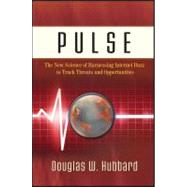Pulse : The New Science of Harnessing Internet Buzz to Track Threats and Opportunities
, by Hubbard, Douglas W.- ISBN: 9780470932360 | 0470932368
- Cover: Hardcover
- Copyright: 5/3/2011
This book will introduce how the Internet can be used to assess market trends and public opinion before the slower and far more expensive, traditional government reports and Gallup polls are published. It could be similar to having a real-time "Dow Jones" index for buzz about a company or confidence in the economy. The book will talk about how to take this raw data and validate it using some traditional methods without relying on them entirely in the future. It will discuss how this will eventually effect business and government in a much broader sense.For example, this tool allows for a new kind of real-time decision analysis that will greatly improve productivity. Pulse will describe how most major decisions are made on information that was available a long time prior to the beginning of the analysis of the decision, never mind the decision itself. Real-time information about socio-economic trends and public opinion will allow for a kind of "programmed trading" for some decisions similar to how trading firms automate buying and selling.Specific examples will include: A Canadian epidemiologist tracked Google searches on the phrase "flu symptoms". He used this information to track flu outbreaks faster than the Canadian health authorizes could keep up. His success later inspired Google's "Flu Trends" tool. Researchers at HP labs showed how tracking Twitter comments about upcoming movies could reliably predict box office success better than any other method. The number of Google searches nationwide on the term "unemployment" (publicly available through "Google trends") tracks very closely to Bureau of Labor Statistics (BLS) unemployment reports. The difference is that BLS releases its data monthly after sampling 60,000 households while Google trends data is available weekly and for free. Research by Carnegie Mellon students show that tracking Twitter comments produces nearly the same results for consumer confidence and political polls as Gallup polls would produce except that the results are real-time and free. An introduction to the possibility that tracking auctions on eBay, ranks of books on Amazon, or job-seeking websites may become the new way to track real time data about the economy and trends in public opinion. LA County detected (with 85% accuracy) collusive fraud rings in public assistance programs based on analysis of links in social networks. Examples of "Semantic" analysis tools are being developed to process thousands of blogs and Facebookcomments that could be used to assess security threats like potential terrorism.







